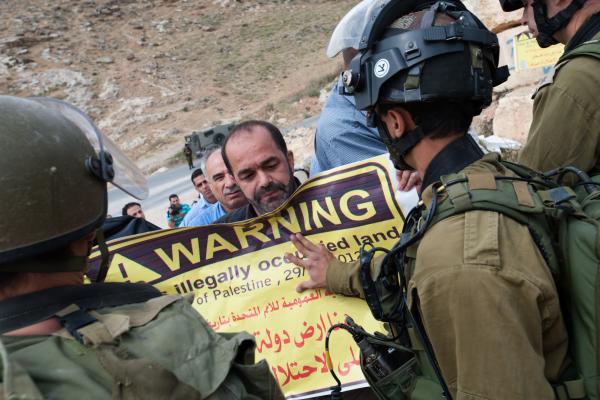THE ISRAELI/PALESTINIAN conflict has claimed countless lives, caused unimaginable trauma, and devastated families and communities for decades. As Christians, we should lament this ongoing tragedy and commit ourselves to the cause of peace. However, we must also confess to and repent of the fact that American Christians have often been an obstacle to peace in the region.
On one side of the conflict, many evangelicals have historically been uncritical supporters of Israel. This support often stems from dispensationalism—the belief that a Jewish state must exist in the Middle East in order for Christ to return. Because the continued existence and thriving of the Israeli state is viewed by these Christian Zionists as nothing less than God’s will, they have historically been unwilling to criticize or even question Israel’s behavior. This reflexive and one-sided support for the Israeli government and military has made it much more difficult for the U.S. to be considered an honest broker in the peace process.
In contrast to evangelicals, some mainline Protestants and other liberal Christians have also been a problem to peace by taking an unrelentingly negative attitude toward Israel. Some Christians from this camp have gone so far as to argue that the premise upon which the modern state of Israel was founded is unjust and illegitimate. Given the present reality of Israel’s existence—not to mention the horrors of the Holocaust—coming to the table with that position is not helpful to having a productive conversation about creating peace in the region. Furthermore, when Israel’s critics downplay or fail to acknowledge Israel’s very real security concerns, it diminishes the validity of their critique of Israel’s actions.
Yet while Christians on both sides of the Israel/Palestine issue have often taken positions that impede progress toward peace in the region, there are also hopeful examples of a more honest and fair approach being taken by both evangelicals and mainline Protestants. Many young evangelicals are rejecting the message of Christian Zionism, dwelling less on the afterlife and the end times and focusing more on making the reign of God a reality on earth “as it is in heaven” by pursuing social justice and seeking to be the “peacemakers” that Jesus called us to be. As such, they are more sensitive to the plight of the ordinary Palestinians and Israelis who have suffered so much at the hands of their failed leaders and the most radical elements of their respective societies. And many mainline Protestants are also taking a much more nuanced position on the Israeli/Palestinian conflict. They are recognizing Israel’s right to exist and its security concerns, while still offering a prophetic challenge to unjust Israeli policies and actions.
In approaching the Israeli/Palestinian conflict, I believe that as Christians we are called to be both honest and fair, rather than being balanced or neutral in our witness. But what does a more honest and fair perspective look like? First, we need to reject the distortions propagated by elements at both extremes of the conflict. And then we need to look at the situation with clear eyes and speak the truth in love, no matter how hard it is to do.
One of those truths is the fact that Israeli settlements in the West Bank are perhaps the largest obstacle to a lasting peace in the region. These are aggressive forays into Palestinian territory, and their presence looms over the chances for peace in the Middle East, just as the ultramodern hilltop settlements themselves loom over the poor Palestinian villages in the valleys below them.
Another truth is that there is indeed Palestinian violence against Israelis. Shootings, suicide bombings, and rocket attacks have been carried out by terrorists against Israeli civilians. The existence of horrific violence against innocent Israelis cannot be disputed. And such violence can never be justified.
But if we are to be honest and fair, we need to speak clearly to the balance of power in this conflict. There is no “symmetry” in the violence of the Middle East today. It is simply an undeniable fact that the overwhelming power is on the Israeli side and the majority of victims are on the Palestinian side. The Israelis respond to the tragic deaths of their civilians at the hands of terrorists by shelling Palestinians in massive, disproportionate retaliation. The casualties are enormous, and the majority of them are civilians. Violence against civilians is a definition of terrorism, and it must be named and condemned on all sides.
For American Christians, to truly promote peace in the region, we need to pursue an approach that is pro-Israeli, pro-Palestinian, and pro-peace. We must support the hopes, aspirations, safety, and desire to live in peace of people on both the Israeli and Palestinian sides of the conflict. And we can and must do so without ignoring the facts on the ground or the balance of power. Only then can we really become the peacemakers Christ wants us to be—in this conflict and so many others.

Got something to say about what you're reading? We value your feedback!
